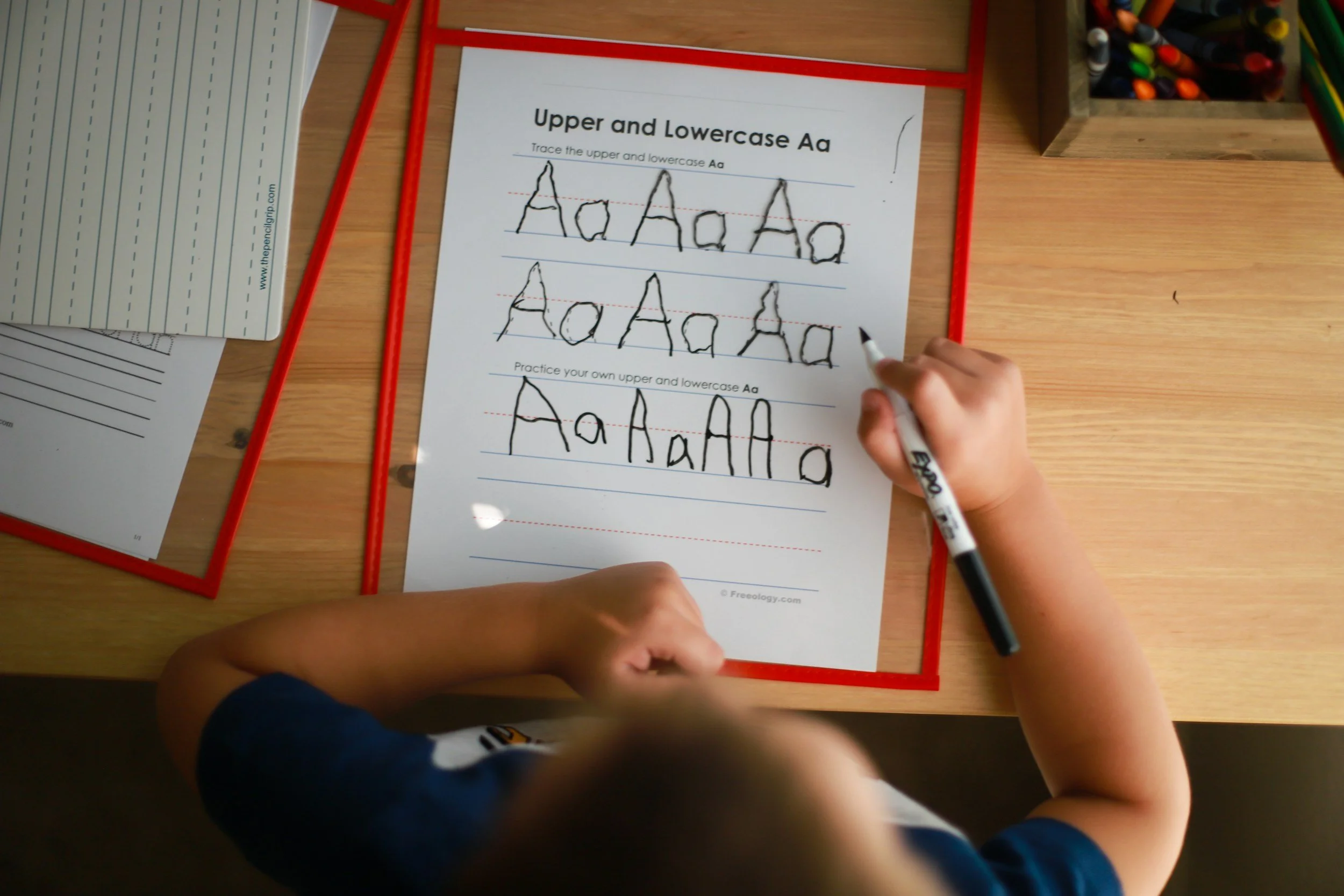
Why Comparison Makes You Feel Like You’re Failing as a Mom
Many moms believe other mothers have it all together, but that’s rarely the full story. Comparison tends to show up when moms are burned out, overwhelmed, or disconnected from their own self-trust. What looks like confidence on the outside is often just containment. Therapy for moms, including therapy intensives in Ohio, can help reduce comparison, rebuild confidence, and make motherhood feel lighter again.

Why So Many Working Moms Feel Like They’re Failing at Motherhood and Marriage
Motherhood can quietly strain even the strongest relationships. When you’re giving so much to your kids, it’s normal to feel like there’s nothing left for your partner. That distance doesn’t mean a lack of love. It often means burnout and emotional overload. With the right support, this season can feel less heavy and more manageable, without blaming yourself for how hard it feels.

Why So Many Moms Feel Like They’re Always Behind (Even When They’re Doing So Much)
Many moms feel like they’re always behind, even when they’re doing a lot. That feeling usually comes from burnout, mental load, and constant self-pressure rather than actual failure. Therapy for moms, including therapy intensives in Ohio, can help reduce self-criticism and make motherhood feel more manageable again.

"Is This Normal?” Common Parenting Worries That Live Rent-Free in a Mom’s Brain
If you’re often asking yourself “Is this normal?” you’re probably carrying more pressure than you realize. Many childhood behaviors fall within typical development, but the anxiety around them can be overwhelming. Therapy can help moms calm the constant worry, trust their instincts, and feel steadier in motherhood.

New Year Goals for Moms: Grace Over Pressure
For moms, the New Year often brings pressure rather than hope. Starting with grace, nervous-system-aware goals, and realistic support can lead to more sustainable change. You don’t need a “new you.” You need care that fits the life you’re already living.

Estranged or Toxic Family? Why the Holidays Are So Hard and How to Cope
The holidays can feel especially painful when you’re estranged from family or when relatives don’t make an effort to show up for your kids. Christmas tends to amplify that grief, especially for moms carrying emotional labor and old attachment wounds. You’re not overreacting. You’re responding to something that matters, and it’s okay to create a version of the holidays that feels safer and more supportive for you and your family.

Why Do I Feel So Lost After Having Kids?
Motherhood changes your body, your mind, your identity, your nervous system, and even how you see yourself in the mirror. If you’ve ever caught your reflection and thought, “I don’t even recognize this version of me,” that feeling makes sense. Your responsibilities have multiplied, your body has shifted, and the emotional and mental load can make you feel heavier and more stressed. This post explores why this happens and how EMDR Therapy or therapy intensives can help you reconnect with yourself in a real, grounded way.

How Self-Judgment Keeps Moms Overwhelmed
Moms don’t just feel feelings. Moms also judge themselves for having the feelings. That double layer is what leaves you overwhelmed. When you tell yourself you “shouldn’t feel this way,” your nervous system hears it as more pressure. This post gently unpacks why moms do this, why it makes everything feel harder, and how support, EMDR Therapy, or therapy intensives can help you feel grounded again.

When Your Kids’ Sibling Fights Trigger You More Than They Should
If sibling arguments instantly spike your anxiety, irritability, or anger, it’s not because you’re impatient. It’s because your nervous system is interpreting conflict as danger. Noise, tension, crying, yelling, and chaos can activate old emotional patterns, overstimulation, and the pressure to keep peace. This post breaks down why sibling conflict hits so hard for moms and what helps your body stay grounded. If this feels familiar, I am a therapist in Ohio who specializes in therapy for mothers, specifically EMDR Therapy or therapy intensives.

When I got sick at the worst time: a mom’s honest holiday breakdown
Getting sick right before a holiday feels awful, but it isn’t because you’re not handling things well. It’s just that you’ve been carrying so much that slowing down shines a light on it. If being sick makes you feel behind or guilty, that’s not failure...that’s a tired, overloaded mom doing her best.

Parenting When the World Feels Like It’s on Fire: Managing Anxiety, Guilt, and Fear
When the world feels heavy with news, school safety worries, global conflicts, political chaos, climate fear, all of it, it’s normal for moms to feel anxious, guilty, and scared. This post helps you understand why your nervous system reacts so strongly, how the mental load intensifies your fear, and what you can actually do to stay grounded and parent in a way that aligns with your values.
Some days it feels like you open your phone and immediately regret it.
There’s another tragedy. Another headline. Another crisis. Another debate about something that affects families and kids.
And as a mom, it hits differently.
Your mind goes straight to:
“How do I keep my kids safe?”
“Are they growing up in a world that’s too scary?”
“How do I stay grounded when everything feels chaotic?”
“Am I doing enough?”
This is not overreacting. This is not being dramatic. This is what happens when you love people so deeply that their safety becomes tied to your nervous system.
Today we’re talking about the very real anxiety moms carry when the world feels unpredictable plus how to manage fear without shutting down or spiraling.

5 Ways to Lighten Your Emotional Load Without Feeling Guilty
You are doing the remembering, planning, soothing, and fixing, often before 9 a.m. No wonder you are tired before breakfast. You can make the load lighter without turning into a different person. Name what you are carrying, set gentler weekday standards, share ownership like a manager, add tiny daily recovery, and deal with the root guilt that keeps telling you to do more. Kindness counts. So do small, steady systems.

Daylight Savings and Dysregulation: Why Moms Feel Extra Exhausted
It is Thursday and we fell back on Sunday. Your nervous system and your child’s nervous system are still catching up. The shift messes with light cues that set sleep, appetite, mood, and focus, which is why kids are waking earlier and everyone feels grumpier. Expect 7 to 14 days of extra crankiness, odd wake times, and bigger feelings. Treat this as a recovery window: morning light, protein at breakfast, short movement bursts, a “quiet minute” in the afternoon, and a simpler, slightly earlier bedtime. If old triggers feel sharper, that is biology plus history. Small nervous system resets and kind expectations work better than trying to force a perfect schedule.

Reparenting Yourself With EMDR Therapy: Heal Attachment Wounds and Break the Cycle in Motherhood
Reparenting means giving yourself the steady attunement, boundaries, and care you missed so you can respond instead of react in motherhood. EMDR therapy helps your brain process attachment wounds and softens old triggers, so you can stop the vicious cycles and create new beliefs and patterns that serve you better. Pair the work with small and gentle supports like body cue check-ins, checking in with younger parts that need your attention, brief slow bilateral tapping, and gentle repair after conflict. As moms we carry quiet guilt about not feeling as grateful as we think we should, even when life looks “good.” This emotional weight doesn’t mean something is wrong with you; it means you’ve been carrying too much for too long. Working with a therapist who understands the mental load, grief, and trauma of motherhood can help you feel lighter, more grounded, and more connected to genuine joy again. broken or dramatic. It’s because your nervous system is working overtime to protect you. For many moms, chronic worry is rooted in trauma, exhaustion, and the invisible pressure to keep everyone safe. With EMDR Therapy and support from a therapist, you can help your body and mind relearn what safety actually feels like. You deserve to feel inner calm, not panic.

When Gratitude Feels Heavy: A Therapist for Moms Explains
You can love your family and still feel overwhelmed, disconnected, or unhappy sometimes. As moms we carry quiet guilt about not feeling as grateful as we think we should, even when life looks “good.” This emotional weight doesn’t mean something is wrong with you; it means you’ve been carrying too much for too long. Working with a therapist who understands the mental load, grief, and trauma of motherhood can help you feel lighter, more grounded, and more connected to genuine joy again. broken or dramatic. It’s because your nervous system is working overtime to protect you. For many moms, chronic worry is rooted in trauma, exhaustion, and the invisible pressure to keep everyone safe. With EMDR Therapy and support from a therapist, you can help your body and mind relearn what safety actually feels like. You deserve to feel inner calm, not panic.

Why Can’t I Stop Thinking About the Worst-Case Scenario?
If your mind constantly jumps to worst-case scenarios...accidents, illnesses, disasters, what-ifs...it’s not because you’re broken or dramatic. It’s because your nervous system is working overtime to protect you. For many moms, chronic worry is rooted in trauma, exhaustion, and the invisible pressure to keep everyone safe. With EMDR Therapy and support from a therapist, you can help your body and mind relearn what safety actually feels like. You deserve to feel inner calm, not panic.

How to Raise Good Kids in a World That Feels Heavy
If you’ve ever wondered how to raise kind, grounded kids when the world feels overwhelming, I feel you. Between the headlines, social media, and everyday chaos, it can feel impossible to protect your kids’ innocence while preparing them for reality. But the truth is, you don’t have to have all the answers. You just need to keep showing up...with love, honesty, and self-awareness. As a therapist for moms offering therapy in Columbus, Ohio, I’ve seen how EMDR and trauma-informed therapy can help mothers process the heaviness they feel, so they can raise emotionally safe, compassionate kids in an uncertain world.

Why Do I Get So Mad When My Kids Don’t Listen to Me?
If you feel like you’re always snapping at your kids, it’s not because you’re a bad mom. It’s because your nervous system is overwhelmed, your emotional needs are likely unmet, and your triggers might be rooted in past experiences. In this post, we explore what’s really going on, how childhood wounds and overstimulation play a role, and how therapy can help you parent with more calm, compassion, and connection.

I Miss Who I Was Before I Became A Mom
You love your kids. You wouldn’t trade them for anything. But sometimes? You miss who you used to be. The freedom. The fun. The version of yourself that wasn’t constantly wiping things, solving things, or holding it all together. This post is for the moms quietly wondering, where did I go? You’re not alone...and reconnecting with yourself is not only possible, but essential. Whether it’s through therapy for mothers or a therapy intensive, there’s space for you again.

“I Just Need Five Minutes”: Why Moms Struggle to Rest
If rest feels impossible...even when you technically have time...it’s not just you. Motherhood is relentless, and the pressure to “do it all” runs deep. But you deserve more than survival mode. Therapy can help. Whether through weekly support or a deeper reset with therapy intensives in Ohio, you can learn to rest in a way that actually restores you. You’re not just tired. You might be burned out. But there's hope. You don't need to stay there.

